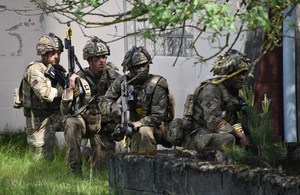FCDO apologises for historic ban on LGBT staff
The Foreign, Commonwealth and Development Office (FCDO) has apologised for the historic ban on LGBT people working in the Diplomatic Service, which was lifted in July 1991.
In a message to staff, Sir Philip Barton, Permanent Under-Secretary at the FCDO and Head of the Diplomatic Service, said:
The ban was in place because there was a perception that LGBT people were more susceptible than their straight counterparts to blackmail and, therefore, that they posed a security risk.
Because of this misguided view, people’s careers were ended, cut short, or stopped before they could even begin.
And the diplomatic service undoubtedly deprived itself of some of the UK’s brightest and best talent.
I want to apologise publicly for the ban and the impact it had on our LGBT staff and their loved ones, both here in the UK and abroad.
Sir Philip noted the progress made by the FCDO as a diverse and inclusive employer in the 30 years since the end of the ban, and the work the UK does to champion LGBT rights internationally.
He said:
In the 30 years since the ban was lifted, the FCDO has made great progress in becoming a proud and inclusive employer of LGBT people, and a champion for LGBT rights around the world.
I pay tribute to all our LGBT staff – past and present – who helped secure change within the Diplomatic Service, while representing their country with professionalism and dedication.
I thank them for the contributions they have made, and continue to make.
Foreign Secretary Dominic Raab said:
I am grateful to the UK’s LGBT diplomats, past and present, who so brilliantly represent our country and promote our values around the world.
As co-chair of the Equal Rights Coalition, we are working with 41 partner countries to tackle discriminatory laws and prejudice globally.
The UK champions LGBT rights because we believe freedom and tolerance are a source of strength in communities at home and abroad.
The announcement comes as the UK prepares to co-host a conference of the intergovernmental Equal Rights Coalition (ERC) on 6-7 July. The ERC is a group of 42 countries that are committed to the protection and promotion of the rights of LGBTI people.
The conference will launch a new five-year strategy aimed at increasing international cooperation and action on LGBTI rights. It will bring together ministers from the 42 ERC countries, representatives from civil society organisations, and participants from international organisations including the United Nations and World Bank.
The ERC conference will be an important milestone ahead of a UK-hosted international LGBT rights event next year.
‘Safe To be Me: A Global Equality Conference’ will take place on 27-29 June 2022, which coincides with the 50th anniversary of the first official London Pride marches.
It will focus on making progress on legislative reform, tackling violence and discrimination, and ensuring equal access to public services for LGBT people.
